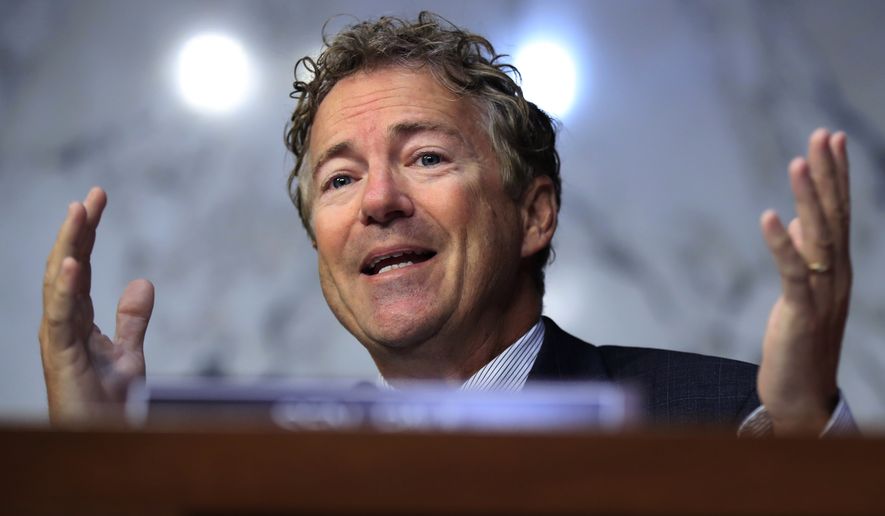Pro-life activists descended on Sen. Rand Paul’s office in Kentucky on Thursday with a simple message: If he votes against a last-ditch bill to repeal Obamacare and defund Planned Parenthood, then he will betray the core of conservatives’ beliefs.
Mr. Paul is one of a handful of holdouts on the latest repeal bill. He said it leaves too much of Obamacare intact.
But the bill’s supporters say it’s the best — and probably only — chance they have to dent the 2010 Affordable Care Act and if Mr. Paul is the one who stymies them, then he will be complicit in funding the “abortion Goliath” of Planned Parenthood.
“The disastrous status quo that is Obamacare is harming families, using our taxpayer dollars to fund abortion and line the pockets of Planned Parenthood’s billion-dollar abortion industry,” said Kristan Hawkins, president of Students for Life of America.
Mr. Paul, who won re-election in November, said he is pro-life but didn’t promise voters to keep 90 percent of Obamacare’s taxes and regulations in place to reshuffle dollars among the states.
Some conservatives say they cannot fault Mr. Paul, but his stance is clearly rankling congressional Republican leaders and the White House, whose two previous repeal efforts failed.
Mr. Paul backed the second proposal in July, but three other Republicans — Sens. Susan M. Collins of Maine, John McCain of Arizona and Lisa Murkowski of Alaska — balked.
Republican leaders were hoping a proposal by Sens. Lindsey Graham of South Carolina and Bill Cassidy of Louisiana, which would pool money being used to fund Obamacare and siphon it back to the states through fixed block grants, would be able to swing at least one of those votes.
But Mr. Paul is deepening the opposition.
“The president and I consider Sen. Paul a friend. He’s a good man, but he’s wrong about this,” Vice President Mike Pence said Thursday on the “Fox and Friends” program. “The Graham-Cassidy bill repeals and replaces Obamacare. It repeals the individual mandate. It repeals the businessman mandate. It repeals the tax penalties associated with that.”
Political analysts say Kentucky voters are not attacking Mr. Paul — he just got re-elected in November — but that doesn’t mean he won’t suffer.
“If he becomes the John McCain of this bill, then I think it could hurt him,” said Ted Jackson, a Republican Party strategist in Kentucky.
Mr. Jackson said Kentucky voters like the blunt-spoken libertarian, but he is not as powerful as their other senator, Majority Leader Mitch McConnell, or President Trump, who are pressuring lawmakers to pass the bill. Republicans also expect action on repealing Obamacare.
D. Stephen Voss, a politics professor at the University of Kentucky, said Mr. Paul could find himself trying to explain the defeat of a repeal bill after his preferred solution failed.
“I do not know that undermining the Obamacare repeal would hurt Paul electorally in any direct way, given how much time will pass before he’s up for re-election and given that many voters do not focus on policy details,” he said. “Right now, Paul’s bigger concern should be protecting his standing in the Senate with his party colleagues, whose support he will need to get things done.”
Some of Mr. Paul’s colleagues are clearly agitated, saying every Senate Republican has a duty to support the final Obamacare repeal bill.
Mr. Paul, though, has shown no signs of budging.
He said he wants provisions that would allow insurance policies to be sold across state lines, allowing Americans without job-based insurance to band together and avoid the individual insurance market altogether.
“Sen. Paul is continuing to work with the president for real repeal,” Paul spokesman Sergio Gor said. “Additionally, Sen. Paul only works for the people of Kentucky, not specific groups or other senators in D.C. The people of Kentucky sent him to Washington to repeal Obamacare, and this bill doesn’t deliver.”
Jason Pye, vice president of legislative affairs for FreedomWorks, said he can’t fault Mr. Paul for staking out a grounded position.
“He’s the one guy in the chamber saying, ’Look, we’ve got to do what we said we would do,’” he said. “It’s hard for me to criticize him. I don’t think he should be criticized for that.”
Mr. Trump, though, does think Mr. Paul deserves chiding.
“Rand Paul is a friend of mine but he is such a negative force when it comes to fixing healthcare. Graham-Cassidy Bill is GREAT!” the president said in a Twitter post Wednesday.
Conservative pressure groups say it’s unfair to single out Mr. Paul when moderate Republicans have been reluctant to fully gut President Obama’s signature program or rein in spending on Medicaid insurance for the poor.
One holdout — Ms. Collins — said she preferred a bipartisan fix that sputtered in the Senate Health, Education, Labor and Pensions Committee. Many observers think she will reject the last-ditch plan.
That leaves two key holdouts in Ms. Murkowski and Mr. McCain.
“I’m not sure they’ll bring it to the floor if those two senators haven’t indicated to McConnell they’re going to vote for it,” said John Desser, a former Bush administration health care official and senior vice president for government affairs at eHealth, a website that connects users with insurance. “Unless he just wants to make the point again, it’s the same two holdouts who are preventing action.”
• Tom Howell Jr. can be reached at thowell@washingtontimes.com.




Please read our comment policy before commenting.